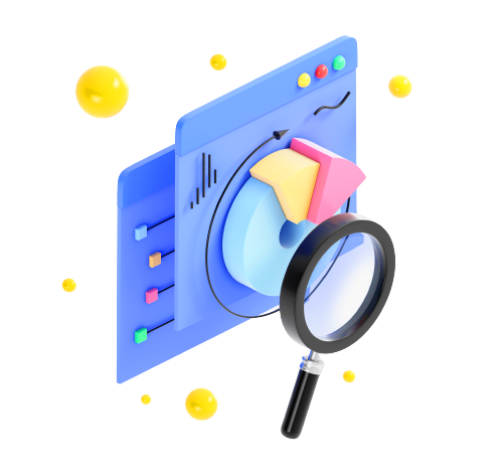- Home
- Blog
- Content MarketingBlog vs. Podcast: What’s the Difference, and Which Is Better?
Blog vs. Podcast: What’s the Difference, and Which Is Better?
 Savannah Swanson
Savannah Swanson Content Writer
Content Writer
 August 11, 2023
August 11, 2023 13 minute read
13 minute read- Savannah is a copywriter with a B.S. in communications and certification in digital marketing. In her free time, she loves watching true crime docs, reading, writing forBookstr.com, and hoarding coffee mugs.
To blog, or not to blog — that is the question. But if you’re on this page, the question isalso: to podcast, or not to podcast?
In the world ofcontent marketing, businesses often find themselves engrossed in the “blog vs. podcast” debate. After all, both are great ways to build better relationships with your audience. But which one is better, and how do you know which is a good fit for your business?
Today we’re helping you answer those questions and more. We’re breaking down blogs vs. podcasts and discussing:
- What is a blog?
- What is a podcast?
- Blog vs. podcast: Key differences
- Blog vs. podcast: Which is better?
- 3 tips for starting a business blog
- 3 tips for starting a business podcast
Keep reading to learn more about the world of blogging and podcasting, or check out how WebFX can help you with all things content marketing by giving us a call at888-601-5359orcontacting us onlinetoday.
37%of marketers say that generating high-quality leads was one of their biggest challenges.
We want to decrease that percentage.
WebFX can help you generate high-quality leads with a customized marketing strategy.
Learn More About Lead Generation Services

What is a blog?
A blog is like an online diary that anyone can access. Regularly updated blogs deliver written content about any topic or industry, niche or general. While we often hear about professional bloggers who write about their thoughts, travels, and hobbies, blogs are also a great tool for businesses.

Business blogs can be found on a company’s website, usually somewhere within the top menu options. While blogs are primarily written content, they can also include images and videos to supplement the text.
Pros and cons of blogging for business
Let’s dig deeper into blogs by looking at the pros and cons of business blogging.
PRO: Blogging helps with SEO
Blogging is a great way to improve your website’ssearch engine optimization (SEO)performance because you can useon-page SEOtactics likelink buildingandkeyword optimizationto drive more traffic to your site.
By targeting popular and relevant keywords your audience might use in search queries, you can improve your chances of ranking higher on search engines and improve site visibility.
260%
increase in organic revenue
198%
increase in organic transactions
150%
increase in organic traffic
3872%
increase in sessions from SEO
CON: Blogs require significant time and commitment
Agreat blogdoesn’t happen overnight — it takes significant time and effort to build a blog that attracts readers andencourages engagement.
Additionally, since it’s a popular on-page SEO tactic, it’s going to take time before your blog starts to produce results like increased web traffic and higher search engine rankings.
PRO: Blogging establishes your business’ credibility and expertise
When done right, your blog posts can offera lotof value to your customers. How? By answering common questions your customers and audience has, you can flex your industry knowledge and expertise,building brand authority.
Whether you’re writing in-depth explanations about your industry or offering brief overviews about your products or services, blogs can help you gain recognition as a reliable source of information for your customers.
CON: Blogging is a saturated and competitive market
As we mentioned earlier, blogging is a popular SEO tactic because you can use a variety ofon-page SEO elementsto boost your rankings. In fact,76% of content marketersuse blogging to generate leads (and that doesn’t include the thousands of personal blogs).
When you dive into the world of blogging, you’re going to fight other businesses in and outside of your industry for the attention of Internet users. That said, it’s especially important that you make your blog stand out, or else you could get lost in the sea of other business blogs.
Can you make money from blogs?
You can make money from blogging through a few different revenue sources like selling ads, offering subscription content, and selling products or services.
Additionally, if your blog is popular within a specific niche or industry, companies may reach out to you about featuring their products or services in a sponsored post, or otheraffiliate marketingopportunities.
What is a podcast?
Podcastsare online radio or TV shows that are released episodically. Available on various streaming and podcast platforms like Spotify, Apple Podcasts, and YouTube, podcasts can be audio or video recordings.

Podcasts are recorded via the podcast host speaking directly into a microphone, often having a conversation with a cohost or guest. Once it’s edited, the podcast is published online with or without video, depending on the preference of the podcaster.
Pros and cons of podcasting for business
Before you jump into podcasting, check out some of the pros and cons of starting and maintaining a business podcast.
PRO: Podcasts are flexible in format and accessibility
While podcasts are primarily release in audio form, businesses can also release them with video.
Additionally, many podcasters will attach the episode transcript to assist hearing-impaired users. These formats make podcasts extremely accessible for users. If they have vision impairments, they can listen to the podcast. If they have a hearing impairment, they can read the transcript.
CON: Podcasts require recording equipment and editing expertise
Podcasting requires proper recording equipment and editing software, so if you’re not tech savvy, this can pose a significant challenge.
Great sound quality for podcasts takes time, effort, and money to perfect. If you’re a small business with a tighter budget, or aren’t familiar with podcasting tech, you might find yourself rethinking the idea of starting a podcast.
PRO: Podcasting can help you build a stronger relationship with your audience
For many, listening to a podcast is like listening to a friend. Especially when hosts have a cohost or guest, podcasts are literally a conversation between two or more people, and that format can resonate with listeners.
With podcasts, you can inject more of your brand’s personality into it and talk directly to your audience. This can help you build a stronger relationship with your audience, and make your listeners feel more connected to your brand.
CON: Tracking your podcast’s performance can be tricky
播客的另一个缺点是跟踪你show’s performance analytics. Unfortunately, there’s no single way of tracking how many people are listening to your podcast. Podcasts are downloaded onto devices from host servers — once it’s been downloaded, it’s difficult to track if users listened to it.
On the bright side, though, you can approximate the size of your audience by looking at the number of downloads or subscriptions.
Can you make money from podcasts?
Podcasters can make money off their shows through affiliate marketing opportunities just like bloggers. Revenue streams for podcasts include sponsorship deals, selling paid and exclusive content, donations and crowdfunding, andYouTube ads.
Blog vs. podcast: Key differences
We’ve only scratched the surface of business blogs and podcasts. Look at a more comprehensive breakdown of the difference between blogs and podcasts in the chart below:
| Blog | Podcast | |
| Format/Medium | Written | Audio (primarily), sometimes video |
| Audience Interaction | Reading | Listening, sometimes watching |
| Accessibility | Anywhere online | Streaming platforms (Spotify, Apple Podcasts, iTunes, YouTube, etc.) |
| Equipment Needed | Hosting service (WordPress, Tumblr, Blogger, Wix, Squarespace, etc.) | 承载平台、麦克风、耳机,音频iting software or mixer, recording software |
Blog vs. podcast: Which is better?
So, who’s the big winner in the blog vs. podcast debate?
Unfortunately, we don’t have a definitive answer for that. When it comes to choosing between the success rates of blogs and podcasts, it all depends on the business. Some businesses benefit more from a blog rather than a podcast, and vice versa. Ultimately, it’s up to you to decide what works best for your business and audience.
Look at a few factors to consider when trying to decide whether a blog or podcast is the right move for your business.
Consider your target audience
Your audience is the one on the receiving end of your blog or podcast. Which one will they respond to better? The answer to that question lies within your audience.
Is your target audience younger or older? While older generations do listen to podcasts, it’s much more common for younger generations to lean towards listening to podcasts rather than reading online blogs.
Learn How to Find and Reach Your Target Audience
If your ideal customer is an on-the-go individual, podcasting could be a great avenue for you to explore because, because they’re easy to engage with while doing things or traveling, whereas blogs are better for people who find themselves scrolling through content during their downtime.
Look at your budget and capabilities
Both blogging and podcasting are long-term commitments that require time and effort to maintain. The big difference that could make or break your decision, though, is the cost.
For the most part, blogging is cost efficient, especially if you already have your website established and just need to add another page to it for your blog. Podcasts on the other hand, require equipment and audio software that can range in price. If you’re operating on a strict or tight budget, you may lean toward blogging rather than podcasting.
If budgeting isn’t an issue for you and you’re still unsure of whether to choose blogs or podcasts, think about your team’s capabilities. Do you have tech-savvy people on your team who can navigate podcasting equipment and audio editing software? If so, podcasting could be the way to go. If not, check out blogging.
Think about your SEO goals
As we discussed earlier, blogs have a huge impact your SEO, so if one of your business goals is to perform better on search engines, starting a business blog could be an incredibly smart move for you and your team.
While your business might also benefit from having a podcast, it’s worth thinking about which option is going to help you attract more ideal customers (and retain them).
Looking for an all-in-one SEO audit tool? You've found it.
SEO Checker provides data on key metrics to give you:
- Complete SEO score
- Content Grade
- Site Speed Analysis
- and more.

3 tips for starting a business blog
If you think your business is a great fit for a blog, check out three tips forstarting a business blogto help you get started.
1. Establish your goals
Before digging into the nitty-gritty of your new business blog, like setting up the page and designing it, it’s important that you take some time to think about your goals for it. What are you hoping to accomplish with your blog?
Goal setting is crucial for any digital marketing effort, but it’s especially important when starting a business blog because it keeps your content focused, and most importantly, successful.
Having the goals for your blog in place can help you build the framework for what you want to talk about in your blog and serve as a great starting point when brainstorming content. Once you have foundational content in place, you can begin to expand and branch out with topics.
2. Plan your content
Successful blogs are updated consistently to keep readers coming back for more and avoid them getting bored waiting for new content. To keep up with consistent publishing, we highly recommend that you plan content well ahead of time.
Planning your content helps you get a firm grasp on what you’re publishing, and it takes pressure off your content team to produce something quickly. It leaves your team more time to edit and perfect your posts and avoids any last-minute scrambles to post something.
Learn How To Effectively Plan Blog Content Here!
3. Provide value for your readers
Many businesses use their blog to help their customers by answering common questions about their industry, products, and services. Others use it to keep their audience informed about industry trends and news about your company.
Whatever you decide to do with your business blog, ensure that you’re providing value for your audience and including some kind of incentive to keep returning to your page. Whether that’s keeping them informed about the industry or providing helpful information about your product or service, give readers a reason to read your blog.
3 tips for starting a business podcast
Think your business and audience could greatly benefit from a podcast? Check out these three tips for starting a business podcast to help your get started on your podcasting journey.
1. Establish your podcast goals
Before you start jumping into the excitement of creating a podcast, take a second to think about your goals for the show, and build your podcast around those ideas. What are you trying to accomplish with your podcast?
Identify and establish what you want to cover in your podcast and find your niche. Having your goals in place will positively set the tone for your podcast and make it more enjoyable for your audience, creating consistency and a sense of direction in your show.
2. Choose your podcast cadence, style, and length
Every podcast is unique — some host 10–20-minute episodes, while other can reach up to over an hour long. Choose an average episode length that works for your content and stick with it to create a sense of consistency in your podcast.
除了长度,考虑wh的风格ich you want your podcast to go, and your cadence. Is your show going to be very informal, or will it be a bit more rigid and structured? When you speak, will you act as though you’re giving a presentation to coworkers, or talk as if you’re speaking to a friend?
Whatever the case, choose the style that makes sense for your brand and the content you’re producing. Think about what your audience is receptive to and create a show they want.
3. Plan content and guests ahead of time
最后,确保您计划您的内容和potential guests way ahead of schedule. You never know what could happen — a guest could cancel or reschedule, equipment could malfunction, or recordings could get lost.
Plan your content ahead of time to accommodate any potential roadblocks and ensure you have an adequate cushion between recording day and publishing day. Because every podcast is unique, onlyyouwill know exactly what that cushion is, and how far ahead you should plan content.
Our digital marketing campaigns impact the metrics that improveyour bottom line.
See More Results
WebFX has driven the following results for clients:
$3 billion
In client revenue
7.8 million
Leads for our clients
5.2 million
Client phone calls
Add WebFX to your content marketing toolbox today
So, which one are you choosing in the blog vs. podcast debate? Whatever the case, remember that your friends at WebFX are always available to offercontent marketing advice and assistance.
By partnering with WebFX, you gain access to industry-leading technology that can help you better understand your audience’s wants, needs, and habits. WithMarketingCloudFXand digital marketing professionals, we can help you determine the right step in your content marketing journey.
Whether it’s podcasting or blogging, we’ve got you covered with over 500 team members on deck ready to help you drive real results for your business. Give us a call today at888-601-5359orcontact us onlineto learn more about WebFX’scontent marketing services.
-
 Savannah is a copywriter with a B.S. in communications and certification in digital marketing. In her free time, she loves watching true crime docs, reading, writing forBookstr.com, and hoarding coffee mugs.
Savannah is a copywriter with a B.S. in communications and certification in digital marketing. In her free time, she loves watching true crime docs, reading, writing forBookstr.com, and hoarding coffee mugs. -
 WebFX provides digital marketing solutions with expert marketers, designers, and developers to increase visibility, conversions, and revenue.Learn more
WebFX provides digital marketing solutions with expert marketers, designers, and developers to increase visibility, conversions, and revenue.Learn more
Try our free Marketing Calculator
Craft a tailored online marketing strategy! Utilize our free Internet marketing calculator for a custom plan based on your location, reach, timeframe, and budget.
Plan Your Marketing Budget

Looking for More?
Get expert ideas, industry updates, case studies, and more straight to your inbox to help you level up and get ahead.
"*" indicates required fields
Try our free Marketing Calculator
Craft a tailored online marketing strategy! Utilize our free Internet marketing calculator for a custom plan based on your location, reach, timeframe, and budget.
Plan Your Marketing Budget








